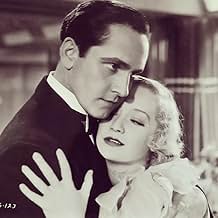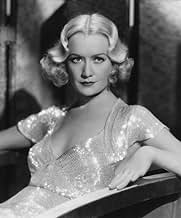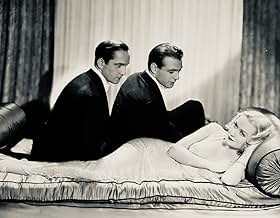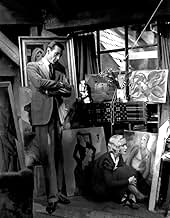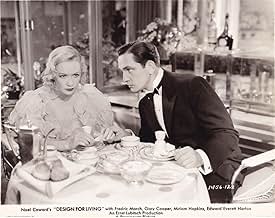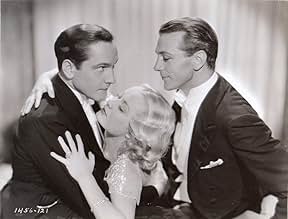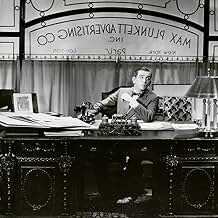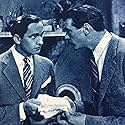AVALIAÇÃO DA IMDb
7,4/10
8,2 mil
SUA AVALIAÇÃO
Uma mulher não consegue decidir entre dois homens que são apaixonados por ela, e o trio concorda em tentar viver juntos em um amigável relacionamento platônico.Uma mulher não consegue decidir entre dois homens que são apaixonados por ela, e o trio concorda em tentar viver juntos em um amigável relacionamento platônico.Uma mulher não consegue decidir entre dois homens que são apaixonados por ela, e o trio concorda em tentar viver juntos em um amigável relacionamento platônico.
- Direção
- Roteiristas
- Artistas
- Prêmios
- 3 vitórias no total
Cosmo Kyrle Bellew
- Man
- (não creditado)
Lionel Belmore
- Theatre Patron
- (não creditado)
Thomas Braidon
- Douglas' Second Manager
- (não creditado)
Nora Cecil
- Tom's Secretary
- (não creditado)
Emile Chautard
- Train Conductor
- (não creditado)
Mathilde Comont
- Heavy Woman
- (não creditado)
Adrienne D'Ambricourt
- Cafe Proprietress
- (não creditado)
James Donlan
- Fat Man with Ring
- (não creditado)
Harry Dunkinson
- Mr. Egelbauer
- (não creditado)
Estelle Etterre
- Woman in audience
- (não creditado)
- Direção
- Roteiristas
- Elenco e equipe completos
- Produção, bilheteria e muito mais no IMDbPro
Avaliações em destaque
I'm not a big fan of the Lubitsch Touch. This, which I hadn't seen in 20 years, I think is my favorite.
The recent Broadway revival of the Noel Coward play, which was supposedly very ooh-la-la and daring, was a bust. Interminable and misguided.
One problem was that the female lead was made very cold. In the movie, Miriam Hopkins is just right: pretty, seductive, witty.
Gary Cooper is sublime. He was a great comedian -- equally good in "Desire," the delightful movie with Dietrich that Lubitsch produced and supposedly had a big hand in directing. Too bad he changed gears so drastically and became the strong, silent Western hero he's known for today (if he's known at all, alas.)
Fredric March was a very fine actor but not a comedian. He is the weakest link; but he works well in the ensemble.
Edward Everett Horton is funny, as always.
It really works, and is as racy today as it must have been when it came out.
The recent Broadway revival of the Noel Coward play, which was supposedly very ooh-la-la and daring, was a bust. Interminable and misguided.
One problem was that the female lead was made very cold. In the movie, Miriam Hopkins is just right: pretty, seductive, witty.
Gary Cooper is sublime. He was a great comedian -- equally good in "Desire," the delightful movie with Dietrich that Lubitsch produced and supposedly had a big hand in directing. Too bad he changed gears so drastically and became the strong, silent Western hero he's known for today (if he's known at all, alas.)
Fredric March was a very fine actor but not a comedian. He is the weakest link; but he works well in the ensemble.
Edward Everett Horton is funny, as always.
It really works, and is as racy today as it must have been when it came out.
While traveling through France, the playwright Thomas B. 'Tom' Chambers (Fredric March) and his best friend, the painter George Curtis (Gary Cooper) meet Gilda Farrell (Miriam Hopkins) and they fall in love with her. Gilda is "protected" by the wealthy Max Plunkett (Edward Everett Horton) and Tom and George are losers, but she cannot decide between them who could be her boyfriend. So she proposes a gentleman's agreement where they would be friends without having sex. She decides to criticize their works and they become successful. But will their platonic relationship work?
"Design for Living" is a movie with a female character ahead of time. Actually the sexy story is a Pre-Code Hollywood that became effective 01 July 1934. The plot has sexual freedom, adultery and even a possible threesome but is naive in the present days. There are many funny situations and this movie is a delightful entertaining. My vote is seven.
Title (Brazil) "Sócios no Amor" ("Partners in Love")
"Design for Living" is a movie with a female character ahead of time. Actually the sexy story is a Pre-Code Hollywood that became effective 01 July 1934. The plot has sexual freedom, adultery and even a possible threesome but is naive in the present days. There are many funny situations and this movie is a delightful entertaining. My vote is seven.
Title (Brazil) "Sócios no Amor" ("Partners in Love")
10capel
Few films have had as much nonsense written about them as Ernst Lubitsch's "Design For Living." From the moment it was released, it was criticized for rewriting Noel Coward's then-daring play (Ben Hecht, the screenwriter, said: "There's only one line of Coward's left in the picture--see if you can find it!"); for casting Americans in parts that had originally been played by Coward, Alfred Lunt, and Lynn Fontanne; for toning down the gay subtexts of Coward's play. All that is, of course, completely irrelevant; the question is not whether the play is faithful to the source material, but whether it's good. And it is, it is.
There are flaws in the film. This was one of the first times Lubitsch had made a movie with little or no music on the soundtrack; previously, in his musicals and his sublime "Trouble In Paradise," he had used background music to cover up potential dead spots and carry the film along. Here there is none of that, with the result that some of the early scenes seem oddly paced. But the wit of the script (written by Hecht but, as always with Lubitsch, carefully supervised and contributed to by the director himself) and the appeal of the performers (more about them later) pull the film through the occasional rough spots, and the second half of the movie is just about perfect.
Another idiotic thing that is often said about "Design For Living" is that Lubitsch and Hecht rewrote Coward due to fear of the censors. In fact, the censors must have had a heart attack when they saw "Design," for this is one of the most sexually frank of the pre-Code Hollywood movies; premarital sex, cohabitation, adultery and frigidity are all clearly portrayed-- but, as always with Lubitsch, they are implied rather than shown. Lubitsch's trademark door and blackout gags are here, and they are hilarious; again, it's not Noel Coward--it's Lubitsch, the cinema's greatest comic filmmaker at the peak of his powers.
But there's something else here that isn't found in most Lubitsch films, and it comes from Ben Hecht, whose cynical, fast-talking, very American style of writing gives the characters a flavor quite unlike the more Continental wit of Lubitsch's usual heroes. (This is also one of the few Lubitsch films where the lead characters are American rather than European.) Critics have sometimes complained that Hecht's somewhat inelegant style was unworthy of either Coward or Lubitsch. Again, I disagree; the moments of Hechtian farce (like the hilarious party scene) are beautifully handled by Lubitsch and turn the film into a forerunner of screwball comedy, the place where Continental charm and hard-driving Americanism meet.
Now to the actors. The "British is Better" attitude of many critics made it inevitable that Lubitsch's American cast would be pilloried. Again, this is not Noel Coward and a Noel Coward style of acting wouldn't work in this context. All the leading players are actually quite wonderful: Miriam Hopkins, one of Lubitsch's favorite actresses, has the best role and gives a marvelously energetic performance as the flighty, pretentious free spirit who tries to substitute art for sex; Gary Cooper is at the height of his youthful charm, with a surprisingly light comic touch and great teamwork with Fredric March. March, who can often be heavy-handed in film comedy, is here charming and funny; it's a tribute to Lubitsch that he got such a genial performance out of him. And, of course, there's Edward Everett Horton, one of Hollywood's finest character actors in one of his finest roles.
If you know and love the Noel Coward play, don't expect this movie to be a faithful adaptation. Think of it as an original work of comedic art that happens to utilize some of the story elements of Coward's play. It's not Noel Coward; it's a splendid romantic farce that, like all great comedies, has serious themes underneath the fun: Sexual freedom, male vs. female roles in society, art, love, friendship. So see it (if you can; it's not on video, alas). It's not Noel Coward, it's Ernst Lubitsch, and despite the occasional flaws, it's Lubitsch at his best.
There are flaws in the film. This was one of the first times Lubitsch had made a movie with little or no music on the soundtrack; previously, in his musicals and his sublime "Trouble In Paradise," he had used background music to cover up potential dead spots and carry the film along. Here there is none of that, with the result that some of the early scenes seem oddly paced. But the wit of the script (written by Hecht but, as always with Lubitsch, carefully supervised and contributed to by the director himself) and the appeal of the performers (more about them later) pull the film through the occasional rough spots, and the second half of the movie is just about perfect.
Another idiotic thing that is often said about "Design For Living" is that Lubitsch and Hecht rewrote Coward due to fear of the censors. In fact, the censors must have had a heart attack when they saw "Design," for this is one of the most sexually frank of the pre-Code Hollywood movies; premarital sex, cohabitation, adultery and frigidity are all clearly portrayed-- but, as always with Lubitsch, they are implied rather than shown. Lubitsch's trademark door and blackout gags are here, and they are hilarious; again, it's not Noel Coward--it's Lubitsch, the cinema's greatest comic filmmaker at the peak of his powers.
But there's something else here that isn't found in most Lubitsch films, and it comes from Ben Hecht, whose cynical, fast-talking, very American style of writing gives the characters a flavor quite unlike the more Continental wit of Lubitsch's usual heroes. (This is also one of the few Lubitsch films where the lead characters are American rather than European.) Critics have sometimes complained that Hecht's somewhat inelegant style was unworthy of either Coward or Lubitsch. Again, I disagree; the moments of Hechtian farce (like the hilarious party scene) are beautifully handled by Lubitsch and turn the film into a forerunner of screwball comedy, the place where Continental charm and hard-driving Americanism meet.
Now to the actors. The "British is Better" attitude of many critics made it inevitable that Lubitsch's American cast would be pilloried. Again, this is not Noel Coward and a Noel Coward style of acting wouldn't work in this context. All the leading players are actually quite wonderful: Miriam Hopkins, one of Lubitsch's favorite actresses, has the best role and gives a marvelously energetic performance as the flighty, pretentious free spirit who tries to substitute art for sex; Gary Cooper is at the height of his youthful charm, with a surprisingly light comic touch and great teamwork with Fredric March. March, who can often be heavy-handed in film comedy, is here charming and funny; it's a tribute to Lubitsch that he got such a genial performance out of him. And, of course, there's Edward Everett Horton, one of Hollywood's finest character actors in one of his finest roles.
If you know and love the Noel Coward play, don't expect this movie to be a faithful adaptation. Think of it as an original work of comedic art that happens to utilize some of the story elements of Coward's play. It's not Noel Coward; it's a splendid romantic farce that, like all great comedies, has serious themes underneath the fun: Sexual freedom, male vs. female roles in society, art, love, friendship. So see it (if you can; it's not on video, alas). It's not Noel Coward, it's Ernst Lubitsch, and despite the occasional flaws, it's Lubitsch at his best.
Delightful even if more Ben Hecht than Noel Coward. The "menage a trois" has real brains, wit and magic. All due to the sensational chemistry between Gary Cooper, Fredric March, Miriam Hopkins and, of course, the unmistakable Lubitch touch. I was going to say that the film seems written today but the sad truth is there is nobody today that could write with this extraordinary elegance. Frediric March is masculine and volcanic, Gary Cooper feminine and irresistible and Miriam Hopkins, a sensational modern comedienne. As if this wasn't enough, Edward Everett Horton as Mr Wrong. The scene in which Hopkins compares Cooper and March to hats is one of my all time favorites.
This was one of the movies I was so sure was going to be stupid and annoying but it turned out to be such fine comedy I've already watched it three times in the past week or two. So many good lines. Tom writes a play called Goodnight Bassington - a comedy in about three acts with a tragic ending. George paints Lady Godiva on a bicycle, despite the fact that a bicycle seat IS a little hard on her historical background. Gilda says that she went to see the above-mentioned painting of Lady Godiva with a friend. "She loved it. We haven't spoken since," Gilda tells George, who begins to pout. He does a fair amount of pouting throughout the film.
Eaglebauer also makes for some fine humour in some scenes near the end, but we never get to see the man. We only hear him bellowing out a joyous song about "falling leaves and fading trees! Goodbye, summer, goodbye!"
But besides all that this really wacky movie is a delight and I sure wish they'd re-release it because it's so good.
So. There's only one thing I have to say to you. Immorality may be fun, but it's not fun enough to replace one hundred per cent virtue and three square meals a day.
Eaglebauer also makes for some fine humour in some scenes near the end, but we never get to see the man. We only hear him bellowing out a joyous song about "falling leaves and fading trees! Goodbye, summer, goodbye!"
But besides all that this really wacky movie is a delight and I sure wish they'd re-release it because it's so good.
So. There's only one thing I have to say to you. Immorality may be fun, but it's not fun enough to replace one hundred per cent virtue and three square meals a day.
Você sabia?
- CuriosidadesConsiderable censorship difficulties arose because of sexual discussions and innuendos, although the Hays Office eventually approved the film for release. However, the film was banned by the Legion of Decency and was refused a certificate for re-release by censor Joseph Breen in 1934 when the Production Code was more rigorously enforced.
- Erros de gravaçãoCamera shadow visible on window frame as Gilda sets the table.
- Citações
Max Plunkett: Immorality may be fun, but it isn't fun enough to take the place of one hundred percent virtue and three square meals a day.
- ConexõesFeatured in Complicated Women (2003)
- Trilhas sonorasThe Star Spangled Banner
(1814) (uncredited)
Music by John Stafford Smith
Hummed by Gary Cooper and Fredric March
Principais escolhas
Faça login para avaliar e ver a lista de recomendações personalizadas
Detalhes
- Data de lançamento
- País de origem
- Idiomas
- Também conhecido como
- Design for Living
- Locações de filme
- Empresa de produção
- Consulte mais créditos da empresa na IMDbPro
Bilheteria
- Faturamento bruto mundial
- US$ 157
- Tempo de duração1 hora 31 minutos
- Cor
- Proporção
- 1.33 : 1
Contribua para esta página
Sugerir uma alteração ou adicionar conteúdo ausente

Principal brecha
By what name was Sócios no Amor (1933) officially released in India in English?
Responda

